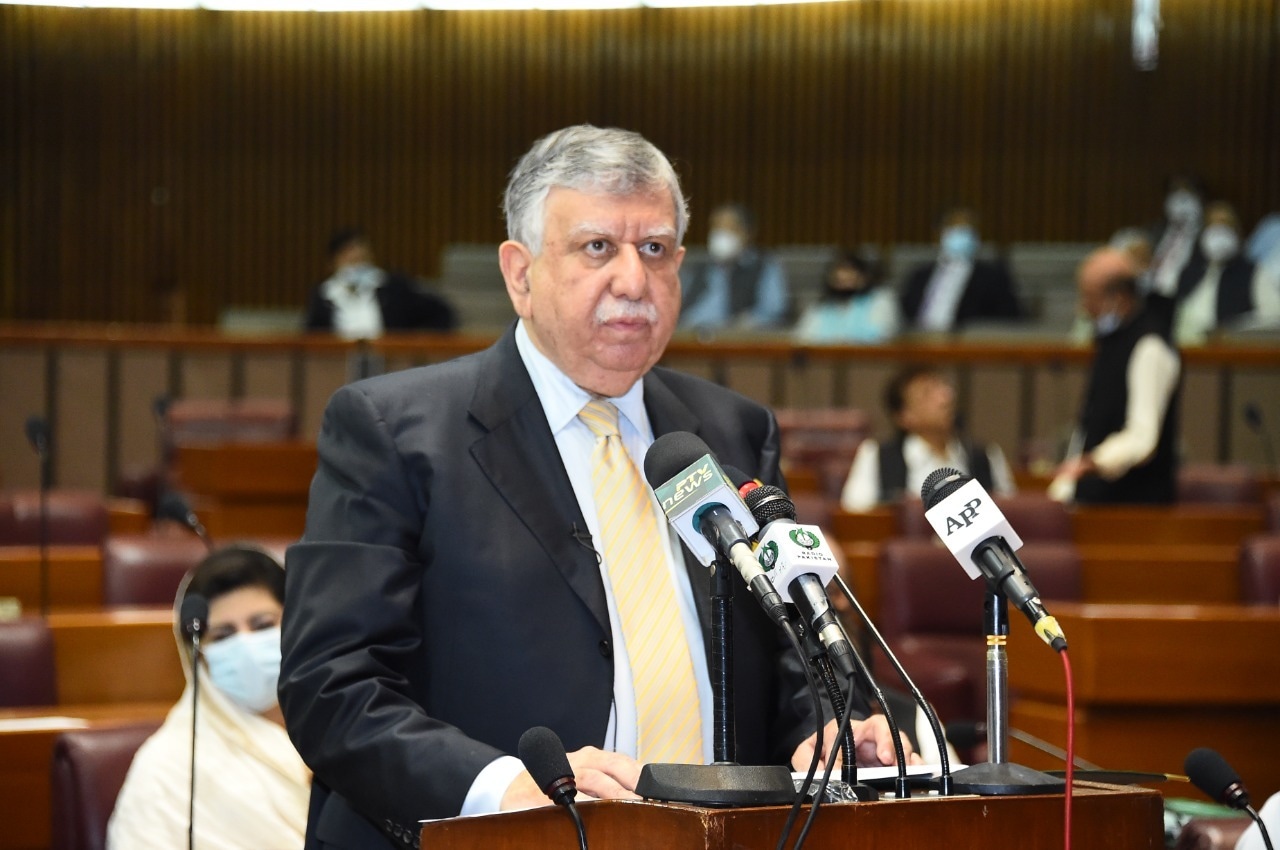Pakistan targets 4.8% GDP growth in upcoming fiscal year
- Finance minister unveils third budget of PTI government
- CGT reduced on sale of shares
- No new taxes on salaried persons in upcoming fiscal year
The Pakistan Tehreek-e-Insaf (PTI) government unveiled its third budget on Friday with an aim to balance GDP growth and fiscal expenditure amid loud ruckus by the opposition.
The budget announcement is being made at a time when Pakistan is combating challenges on multiple fronts including pandemic-induced poverty, a strangling fiscal deficit, and economic recovery.
Finance Minister Shaukat Tarin, presenting the budget for PTI for the first time, continued to power through his speech even as chants by the opposition got louder across the hall.
Tarin, the country's fourth finance minister in less than three years of the PTI government, began his speech drowned in noise by the opposition. Such an environment has become usual in the National Assembly when a government presents the budget. Similar scenes were also seen when the Pakistan Muslim League-Nawaz presented the budget.
Updates and major announcements
The total outlay of the budget stands at Rs8.49 trillion, up 19% from the revised number of the previous year.
Reduction in rate of capital gains tax on disposal of securities from 15% to 12.5%, reveal budget documents. The announcement is likely to give a boost to the KSE-100 Index that has rallied over 70% since its fall at the onset of the pandemic in March 2020.
Defence spending to be Rs1.37 trillion in the upcoming year.
Keeping in view inflationary pressures, salaries of federal government employees and pensions would be increased by 10%, says Tarin.
Allocation for subsidies increased to Rs682 billion.
Withholding taxes on the usage of mobile phone services has been proposed to be reduced.
Vaccination drive will cost Pakistan $1.1 billion till the end of fiscal year 2022 as it aims to inoculate 100 million citizens by then, says the finance minister.
Focus will need to be on increasing production of major crops so that the country does not rely on imports
No new taxes on the salaried class, says Tarin. "The government will introduce reforms in the taxation system that would make it easier to file returns."
CKD kits for electric vehicles will see a reduction in duty, adds the finance minister. Federal excise duty on cars up to 850cc produced in Pakistan will also be reduced.
Karachi's transformation plan will be allocated Rs98 billion from the PSDP, says Tarin. Allocations have also been made to uplift Balochistan and Khyber-Pakhtunkhwa.
An 18% increase in tax collection has come on the back of Pakistan's economic recovery, says Tarin, adding that those who criticise need to look at the revenue figures as well.
The ex-banker says focus will need to be on increasing production of major crops so that the country does not rely on imports. One of Pakistan's major challenges is controlling its import bill that usually spirals, and leads to a balance of payments crisis.
Budget 2021-22 will be pro-growth, and Pakistan will target 4.8% in the coming fiscal year, says Tarin.
Pakistan will offer interest-free loans up to Rs500,000 to boost spending by households, adds the finance minister.
Tarin says Pakistan will take different initiatives to help lift people out of poverty including the Ehsaas programme, adding Rs260 billion have been allocated to it, which is the highest so far.
This is a budget meant to promote growth, says Tarin. Federal PSDP allocation has been increased to Rs900 billion, up from the original allocation of Rs630 billion in the previous year.
The ex-banker also says a national emergency programme has been announced to promote the livestock sector.
Investments and allocations to be made in projects that help people, says Tarin.
On Thursday, Tarin, while unveiling the Economic Survey 2020-21, credited the government for its policies in response to multiple challenges, but said the economy needed a growth of 6-7% if it wanted to reduce unemployment. Pakistan registered GDP growth of 3.9% in the outgoing fiscal year, a number that beat many earlier estimates.
However, many believe that higher growth will need to be financed in part by government expenditure.
The government now has the added challenge of financing Pakistan's vaccination drive as it ambitiously plans to inoculate a maximum number of people against Covid-19 in as little time as possible. The government has already announced that it will be mandatory for all private and public sector employees to be vaccinated, with provinces also introducing penalties of salary suspensions. A couple of days ago, Pakistan announced that it has vaccinated 10 million people.
A recurring wave of Covid-19 and frequent, but 'smarter', lockdowns have already put the economy on a stop-and-start loop. However, Tarin said Pakistan's response to the pandemic has been much better than that of other countries.
JP Morgan puts weight behind Pakistan's economy, but cautions over challenges
In its report earlier this week, JP Morgan, a leading financial services company, said that it saw Pakistan's economy growing at 4% in the coming fiscal year.
"The risks of restrictive actions to contain the virus remain and continue to weigh on the growth outlook," said JP Morgan in its report titled, 'Pakistan: Reassessing the investment thesis'.
























Comments
Comments are closed.